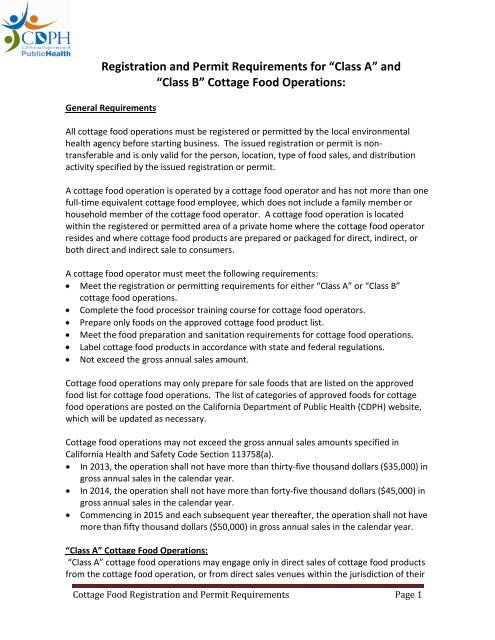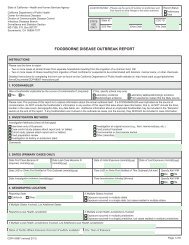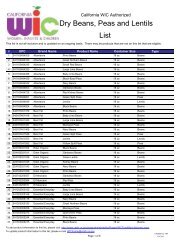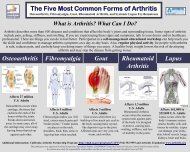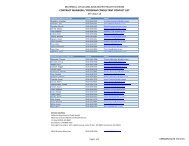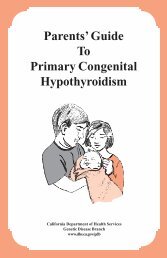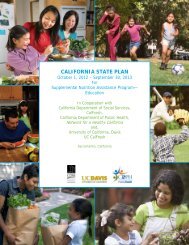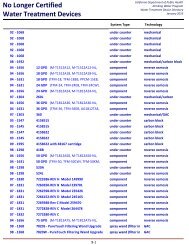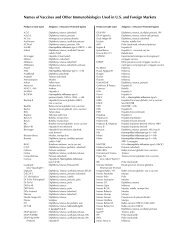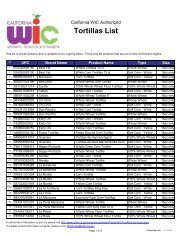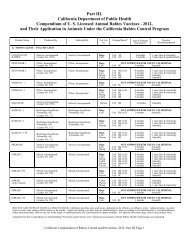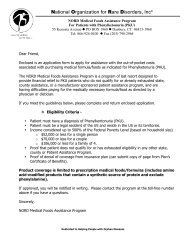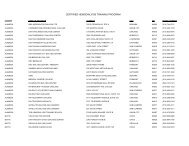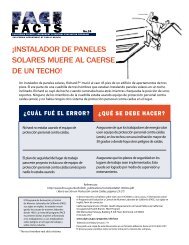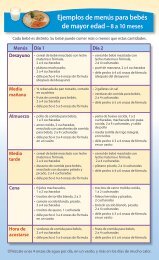Registration and Permit Requirements for “Class A” and “Class B ...
Registration and Permit Requirements for “Class A” and “Class B ...
Registration and Permit Requirements for “Class A” and “Class B ...
Create successful ePaper yourself
Turn your PDF publications into a flip-book with our unique Google optimized e-Paper software.
<strong>Registration</strong> <strong>and</strong> <strong>Permit</strong> <strong>Requirements</strong> <strong>for</strong> <strong>“Class</strong> <strong>A”</strong> <strong>and</strong><br />
<strong>“Class</strong> B” Cottage Food Operations:<br />
General <strong>Requirements</strong><br />
All cottage food operations must be registered or permitted by the local environmental<br />
health agency be<strong>for</strong>e starting business. The issued registration or permit is nontransferable<br />
<strong>and</strong> is only valid <strong>for</strong> the person, location, type of food sales, <strong>and</strong> distribution<br />
activity specified by the issued registration or permit.<br />
A cottage food operation is operated by a cottage food operator <strong>and</strong> has not more than one<br />
full-time equivalent cottage food employee, which does not include a family member or<br />
household member of the cottage food operator. A cottage food operation is located<br />
within the registered or permitted area of a private home where the cottage food operator<br />
resides <strong>and</strong> where cottage food products are prepared or packaged <strong>for</strong> direct, indirect, or<br />
both direct <strong>and</strong> indirect sale to consumers.<br />
A cottage food operator must meet the following requirements:<br />
Meet the registration or permitting requirements <strong>for</strong> either <strong>“Class</strong> <strong>A”</strong> or <strong>“Class</strong> B”<br />
cottage food operations.<br />
Complete the food processor training course <strong>for</strong> cottage food operators.<br />
Prepare only foods on the approved cottage food product list.<br />
Meet the food preparation <strong>and</strong> sanitation requirements <strong>for</strong> cottage food operations.<br />
Label cottage food products in accordance with state <strong>and</strong> federal regulations.<br />
Not exceed the gross annual sales amount.<br />
Cottage food operations may only prepare <strong>for</strong> sale foods that are listed on the approved<br />
food list <strong>for</strong> cottage food operations. The list of categories of approved foods <strong>for</strong> cottage<br />
food operations are posted on the Cali<strong>for</strong>nia Department of Public Health (CDPH) website,<br />
which will be updated as necessary.<br />
Cottage food operations may not exceed the gross annual sales amounts specified in<br />
Cali<strong>for</strong>nia Health <strong>and</strong> Safety Code Section 113758(a).<br />
In 2013, the operation shall not have more than thirty-five thous<strong>and</strong> dollars ($35,000) in<br />
gross annual sales in the calendar year.<br />
In 2014, the operation shall not have more than <strong>for</strong>ty-five thous<strong>and</strong> dollars ($45,000) in<br />
gross annual sales in the calendar year.<br />
Commencing in 2015 <strong>and</strong> each subsequent year thereafter, the operation shall not have<br />
more than fifty thous<strong>and</strong> dollars ($50,000) in gross annual sales in the calendar year.<br />
<strong>“Class</strong> <strong>A”</strong> Cottage Food Operations:<br />
<strong>“Class</strong> <strong>A”</strong> cottage food operations may engage only in direct sales of cottage food products<br />
from the cottage food operation, or from direct sales venues within the jurisdiction of their<br />
Cottage Food <strong>Registration</strong> <strong>and</strong> <strong>Permit</strong> <strong>Requirements</strong> Page 1
local environmental health en<strong>for</strong>cement agency. A direct sale means a transaction between<br />
a cottage food operator <strong>and</strong> a consumer, where the consumer purchases the cottage food<br />
product directly from the cottage food operation. Direct sales include, but are not limited<br />
to, transactions at holiday bazaars or other temporary events, such as bake sales or food<br />
swaps, at farm st<strong>and</strong>s, at certified farmers’ markets, or through community-supported<br />
agriculture subscriptions, <strong>and</strong> also occurring in person at the cottage food operation<br />
location.<br />
Be<strong>for</strong>e opening <strong>for</strong> business, a <strong>“Class</strong> <strong>A”</strong> cottage food operation must become registered by<br />
the local environmental health agency. Additionally, a self-certification check list must be<br />
submitted as part of the registration process. The self-certification check list will<br />
demonstrate that the cottage food operation con<strong>for</strong>ms to the statutory requirements <strong>for</strong><br />
Cottage Food Operations as set <strong>for</strong>th in Cali<strong>for</strong>nia Health <strong>and</strong> Safety Code 114365 et seq.,<br />
which includes the following requirements:<br />
(a) No cottage food preparation, packaging, or h<strong>and</strong>ling may occur in the home kitchen<br />
concurrent with any other domestic activities, such as family meal preparation,<br />
dishwashing, clothes washing or ironing, kitchen cleaning, or guest entertainment.<br />
(b) No infants, small children, or pets may be in the home kitchen during the preparation,<br />
packaging, or h<strong>and</strong>ling of any cottage food products.<br />
(c) Kitchen equipment <strong>and</strong> utensils used to produce cottage food products shall be clean<br />
<strong>and</strong> maintained in a good state of repair.<br />
(d) All food contact surfaces, equipment, <strong>and</strong> utensils used <strong>for</strong> the preparation, packaging,<br />
or h<strong>and</strong>ling of any cottage food products shall be washed, rinsed, <strong>and</strong> sanitized be<strong>for</strong>e each<br />
use.<br />
(e) All food preparation <strong>and</strong> food <strong>and</strong> equipment storage areas shall be maintained free of<br />
rodents <strong>and</strong> insects.<br />
(f) Smoking shall be prohibited in the portion of a private home used <strong>for</strong> the preparation,<br />
packaging, storage, or h<strong>and</strong>ling of cottage food products <strong>and</strong> related ingredients or<br />
equipment, or both, while cottage food products are being prepared, packaged, stored, or<br />
h<strong>and</strong>led.<br />
<strong>“Class</strong> <strong>A”</strong> Cottage Food Operations must also comply with the provisions set <strong>for</strong>th under<br />
Cali<strong>for</strong>nia Health <strong>and</strong> Safety Code 114365.2, which specifies m<strong>and</strong>atory compliance with<br />
Sections 113953.3, 113967, 113973, 113980, 114259.5, 114285, 114286, 114405, 114407,<br />
114409, 114411 <strong>and</strong> 114413 Click Here <strong>for</strong> Link to Statutory Language.<br />
Additionally, operators must ensure that:<br />
(a) A person with a contagious illness refrains from working in the registered area of the<br />
cottage food operation.<br />
(b) A person involved in the preparation or packaging of cottage food products shall keep<br />
his or her h<strong>and</strong>s <strong>and</strong> exposed portions of his or her arms clean <strong>and</strong> shall wash his or her<br />
h<strong>and</strong>s be<strong>for</strong>e any food preparation or packaging activity in a cottage food operation.<br />
Cottage Food <strong>Registration</strong> <strong>and</strong> <strong>Permit</strong> <strong>Requirements</strong> Page 2
(c) Water used during the preparation of cottage food products shall meet the potable<br />
drinking water st<strong>and</strong>ards described in Section 113869, except that a cottage food operation<br />
shall not be required to have an indirect sewer connection. Water used during the<br />
preparation of cottage food products includes all of the following:<br />
(1) The washing, sanitizing, <strong>and</strong> drying of any equipment used in the preparation of a<br />
cottage food product.<br />
(2) The washing, sanitizing, <strong>and</strong> drying of h<strong>and</strong>s <strong>and</strong> arms.<br />
(3) Water used as an ingredient.<br />
(d) A person who prepares or packages cottage food products shall complete a food<br />
processor course instructed by the CDPH to protect the public health within three months<br />
of becoming registered. The course shall not exceed four hours in length. CDPH shall work<br />
with the local en<strong>for</strong>cement agency to ensure that cottage food operators are properly<br />
notified of the location, date, <strong>and</strong> time of the classes offered.<br />
(e) A cottage food operation shall properly label all cottage food products in compliance<br />
with the Federal Food, Drug, <strong>and</strong> Cosmetic Act (21 U.S.C. Sec. 343 et seq.) in addition to<br />
state specific labeling requirements.<br />
Please contact your local environmental health agency to obtain more in<strong>for</strong>mation<br />
<strong>“Class</strong> B” Cottage Food Operations:<br />
<strong>“Class</strong> B” cottage food operations may engage in both direct sales <strong>and</strong> indirect sales of<br />
cottage food products from the cottage food operation, from offsite events, or from a thirdparty<br />
retail food facility such as restaurants <strong>and</strong> markets within the jurisdiction of their local<br />
environmental health agency. <strong>“Class</strong> B” operations may also engage in indirect sales in<br />
counties outside their home permitted county, if the Environmental Health Director in that<br />
outside local environmental health agency jurisdiction permits the operator to conduct<br />
indirect sales within their jurisdiction.<br />
After an initial inspection <strong>and</strong> be<strong>for</strong>e a <strong>“Class</strong> B” cottage food operation opens <strong>for</strong> business,<br />
they must first obtain a permit from the local environmental health agency to engage in the<br />
indirect, or direct <strong>and</strong> indirect, sale of cottage food products.<br />
<strong>“Class</strong> B” operations must con<strong>for</strong>m with the statutory requirements <strong>for</strong> Cottage Food<br />
Operations as set <strong>for</strong>th in Cali<strong>for</strong>nia Health <strong>and</strong> Safety Code 114365 et seq., which includes<br />
the following requirements:<br />
(a) No cottage food preparation, packaging, or h<strong>and</strong>ling may occur in the home kitchen<br />
concurrent with any other domestic activities, such as family meal preparation,<br />
dishwashing, clothes washing or ironing, kitchen cleaning, or guest entertainment.<br />
(b) No infants, small children, or pets may be in the home kitchen during the preparation,<br />
packaging, or h<strong>and</strong>ling of any cottage food products.<br />
(c) Kitchen equipment <strong>and</strong> utensils used to produce cottage food products shall be clean<br />
<strong>and</strong> maintained in a good state of repair.<br />
Cottage Food <strong>Registration</strong> <strong>and</strong> <strong>Permit</strong> <strong>Requirements</strong> Page 3
(d) All food contact surfaces, equipment, <strong>and</strong> utensils used <strong>for</strong> the preparation, packaging,<br />
or h<strong>and</strong>ling of any cottage food products shall be washed, rinsed, <strong>and</strong> sanitized be<strong>for</strong>e each<br />
use.<br />
(e) All food preparation <strong>and</strong> food <strong>and</strong> equipment storage areas shall be maintained free of<br />
rodents <strong>and</strong> insects.<br />
(f) Smoking shall be prohibited in the portion of a private home used <strong>for</strong> the preparation,<br />
packaging, storage, or h<strong>and</strong>ling of cottage food products <strong>and</strong> related ingredients or<br />
equipment, or both, while cottage food products are being prepared, packaged, stored, or<br />
h<strong>and</strong>led.<br />
<strong>“Class</strong> B” Cottage Food Operations must also comply with the provisions set <strong>for</strong>th under<br />
Cali<strong>for</strong>nia Health <strong>and</strong> Safety Code 114365.2, which specifies m<strong>and</strong>atory compliance with<br />
Sections 113953.3, 113967, 113973, 113980, 114259.5, 114285, 114286, 114405, 114407,<br />
114409, 114411 <strong>and</strong> 114413 Click Here <strong>for</strong> Link to Statutory Language.<br />
Additionally, operators must ensure that:<br />
(a) A person with a contagious illness refrains from preparing or packaging cottage food<br />
products in the permitted area of the cottage food operation.<br />
(b) A person involved in the preparation or packaging of cottage food products shall keep<br />
his or her h<strong>and</strong>s <strong>and</strong> exposed portions of his or her arms clean <strong>and</strong> shall wash his or her<br />
h<strong>and</strong>s be<strong>for</strong>e any food preparation or packaging activity in a cottage food operation.<br />
(c) Water used during the preparation of cottage food products shall meet the potable<br />
drinking water st<strong>and</strong>ards described in Section 113869, except that a cottage food operation<br />
shall not be required to have an indirect sewer connection. Water used during the<br />
preparation of cottage food products includes all of the following:<br />
(1) The washing, sanitizing, <strong>and</strong> drying of any equipment used in the preparation of a<br />
cottage food product.<br />
(2) The washing, sanitizing, <strong>and</strong> drying of h<strong>and</strong>s <strong>and</strong> arms.<br />
(3) Water used as an ingredient.<br />
(d) A person who prepares or packages cottage food products shall complete a food<br />
processor course instructed by CDPH to protect the public health within three months of<br />
becoming registered. The course shall not exceed four hours in length. CDPH shall work<br />
with the local en<strong>for</strong>cement agency to ensure that cottage food operators are properly<br />
notified of the location, date, <strong>and</strong> time of the classes offered.<br />
(e) A cottage food operation shall properly label all cottage food products in compliance<br />
with the Federal Food, Drug, <strong>and</strong> Cosmetic Act (21 U.S.C. Sec. 343 et seq.) in addition to<br />
state specific labeling requirements.<br />
Please contact your local environmental health agency to obtain more in<strong>for</strong>mation<br />
Cottage Food <strong>Registration</strong> <strong>and</strong> <strong>Permit</strong> <strong>Requirements</strong> Page 4


